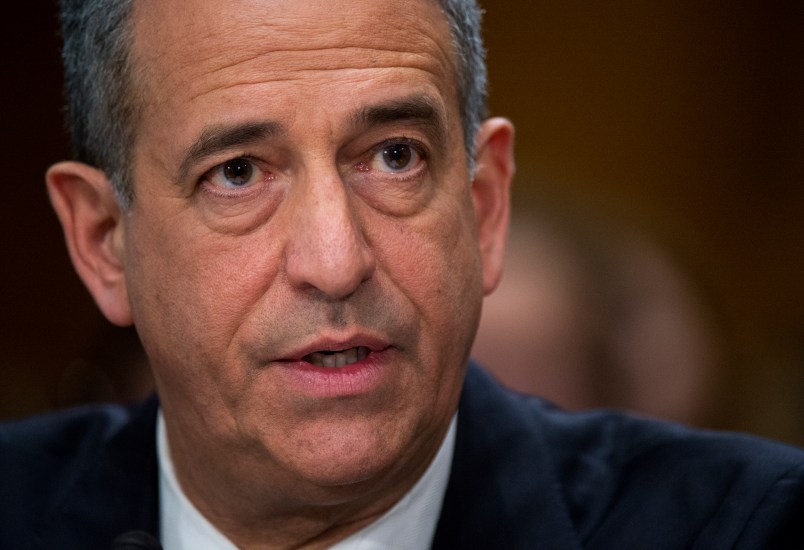WASHINGTON — Democrats’ hopes of retaking control of the Senate in 2016 may well hinge on the ability of a crop of previously defeated candidates to mount political comebacks — and in some cases prevail against the very same Republican opponents they lost to in the 2010 tea party wave.
In Wisconsin, the emerging Democratic frontrunner is Sen. Russ Feingold, the former three-term senator who was defeated by incumbent Republican Ron Johnson. Last week Feingold left his post at the State Department and signaled in a Facebook note that he’s looking at the 2016 Senate race, saying he’ll return home and “travel the state extensively” to listen to Wisconsinites about their concerns and “seek their counsel on how I can best further serve my country and the state I love.”
In Pennsylvania, an early Democratic frontrunner is Joe Sestak, a former U.S. Navy admiral and two-term congressman who lost to Republican Pat Toomey. Sestak has declared a 2016 bid, although he hasn’t courted the national Democratic campaign apparatus, with which he has a bit of a frosty relationship.
In Ohio, Democrats have successfully recruited Ted Strickland, the former one-term governor who was unseated by Republican John Kasich, to challenge Sen. Rob Portman (R). Since announcing his 2016 bid in late February, Strickland has secured the backing of the Democratic Senatorial Campaign Committee and endorsements from Ohio Sen. Sherrod Brown and Reps. Marcia Fudge, Tim Ryan and Joyce Beatty.
These three marquee races — two in blue states featuring 2010 rematches, and one in a key swing state — are among the top four targets (along with the seat of Illinois Republican Sen. Mark Kirk) for Democrats aiming to capture the net five seats they need to secure a Senate majority after 2016.
A national Democratic strategist noted that all three Democratic candidates “lost very close races and almost withstood a national GOP wave in 2010.” Strickland lost by 2.7 points; Sestak lost by 2 points; Feingold lost by 4.9 points.
The National Republican Senatorial Committee dismissed the three as “proven losers.”
“What Ted Strickland, Russ Feingold and Joe Sestak all have in common is they’re proven losers at the ballot box. With a depleted bench, national Democrats are plucking a bunch of retreads and rookies,” NRSC spokesman Jahan Wilcox said.
The upside for Democrats is that the 2016 cycle is expected to be friendlier to them than 2010 as it features a presidential election where low-propensity voters in their tent — unmarried women, minorities and young people — tend to vote. But the big downside is that each of the Republican senators will enjoy the advantages of incumbency — six years to entrench themselves with donors, establishment bigwigs and constituents — as well as a Senate in which their party leaders can set an agenda that is friendly to their reelection bids.
“With so many vulnerable Republican incumbents the DSCC is committed to
finding the candidate in each state that gives us the best chance to
win,” said Justin Barasky, a spokesman for the Democratic Senatorial Campaign Committee, said.
Democrats are also eying former senators who lost in the 2014 wave to step up in 2016, although none of these candidates have said at this point that they intend to run.
In North Carolina, party leaders are hoping to recruit former Sen. Kay Hagan, who narrowly lost after serving one term, to challenge Republican Sen. Richard Burr.
In Louisiana, Democrats believe their best chance of victory in the deep-red state is if ousted three-term Sen. Mary Landrieu seeks the seat currently held by Republican Sen. David Vitter (who is running for governor in 2015).
In Alaska, there are rumors that ex-Sen. Mark Begich may challenge Republican Sen. Lisa Murkowski.







The only “proven losers” are seditious Republicans and their inability to govern.
Vitter is running for GOVERNOR? My God, Louisiana is doomed.
I’d like to see Russ Feingold run for Senate again. I would hope enough Wisconsinites are embarrassed by Ron Johnson and the Republicans. Oh who am I kidding? They think Walker is Presidential material. It’ll be a tough fight.
¨With a depleted bench, national Democrats are plucking a bunch of retreads and rookies," NRSC spokesman Jahan Wilcox said.¨
Projection can be ugly.
Years ago, when the battles gay marriage were in their infancy, and we were still battling over Civil Unions (Remember those?), this same dynamic played out in Vermont. The Civil Union law was passed, and in the next election cycle, a whole bunch of Republicans challenged Democrats in office and won, ginning up support with their “Take back Vermont” jingoism, really a harbinger of the Tea Party.
After a session of two of piss-poor stewardship, most of the original Dems got their office back.